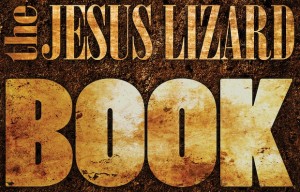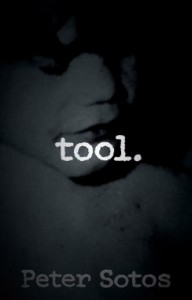The Jesus Lizard Book
 The Jesus Lizard Book
The Jesus Lizard Book
by The Jesus Lizard
Akashic Books, March 2014
176 pages / $29.95 Buy from Amazon or Akashic Books
The Jesus Lizard was the greatest live band ever. This is a sentiment echoed again and again and again in this lovingly crafted hardcover from Akashic Books. Book is filled with testimony from fans, critics, and fellow musicians alike, all trying to articulate the ineffable experience of seeing TJL take the stage, pick up their instruments, and promptly destroy the place.
And they’re not wrong. I saw the band in the first of three final homecoming shows in Chicago during their 2009 reunion tour. Though I was stoked to see the band, in many ways I was mentally preparing myself to be let down, wondering if I’d maybe spoiled the intimate quality of what they offered by seeing it unfold in what was probably hundreds of youtube clips for the preceding three years I’d been listening to them. Not only that, but they were old—like they were in their late forties old, and so nobody could fault them if they fell short of previous glory.
But—fuck me—I had absolutely no idea what I was getting myself into. The guys got on stage, drummer Mac McNeilly cracked his sticks, and within the first verse of the song David Yow was swimming over our heads in a gaudy red button-down and jeans, cowboy boots flailing above us as he shouted, “Give me something to stop the bleeding, cuz I’m fittin to blow. Knock her down the stairwell and kick her. I think you can take her.”
From there it became increasingly clear as the band bruised us with their set list—dark, pernicious, brutal fucking songs—and as Yow took down tallboy after tallboy of Budweiser, you really had no idea what was going to happen. My friend Kurt said he’d stopped making eye contact with Yow after the second song, afraid he was going to slink or slobber or scream his way over and have a laugh at his expense. This wasn’t unwarranted: near the last third of the show, Yow, by this point drenched in sweat and his own foamy vomit, steadied himself on the gate in front of Kurt’s sister and leaned over, gently, but firmly, placing his open palm over her nose and mouth and holding it there, mouthing the words, “I’m so sorry” over and over again with crossed eyes. The bouncer lifted him off of her and plopped him back on stage, coming back over to ask, “Are you okay?”
June 9th, 2014 / 10:00 am
Tool. by Peter Sotos
 Tool.
Tool.
by Peter Sotos
Nine-Banded Books, Feb 2013
146 pages / $13 Buy from Amazon or Nine-Banded Books
DISCLAIMER: This book and my review will offend almost everyone.
Tool. is a hard go. That’s the short of it. In a culture where books are already often marginalized as entertainments or, when not entertainments, as “literature” (a term Sotos hates)—here meaning a kind of artful comment on or discourse with the world—where, at best, the book offers polite critique through lenses that are prescribed by the systems these books claim they challenge—in this culture Peter Sotos will be dismissed outright, both as a writer and as a person, a distinction that’s probably pointless because Sotos has been endlessly vigilant about claiming that, for him, there is no distinction.
That honesty also works to assure he has little footing to stand on in the larger literary conversation. And maybe it should stay that way. I won’t claim it shouldn’t. But all of this leads me to conclude that Sotos may be one of the only writers I can point to, perhaps the only one with so immediate a method, who has made a lifelong project of problematizing the existence of monstrous selves in relation to larger groups: societies, neighborhoods, families. He refuses to deny these selves, refuses to box them up, refuses to refuse access to the components of these selves that exist within his self. And this seriously pisses people off (check out this conversation on the Electrical Audio Message board for tangible evidence)
This reaction, though small, interests me in a number of ways. I’m always curious to encounter ideologies we’ve erected that seem to be beyond taboo. Sex with children, let alone cruel and fatal sex, is a supposedly clear line in the sand, one you do not cross under any circumstances. That Sotos seems interested in using his foot to not only smear that line, but to tunnel into the sand beneath it out onto the other end, elicits active hostility. But, more than this, I’m also curious about why no one seems interested in pointing out the empathy that exists at the bottom, and not just, haters would assume, for the perverts, pedophiles, child murderers, and monsters that populate his work. Certainly, at least in Tool. anyway, there exists a strong, obsessive desire to understand the victim, the impossible other that makes existence excruciating.
May 31st, 2013 / 11:00 am
